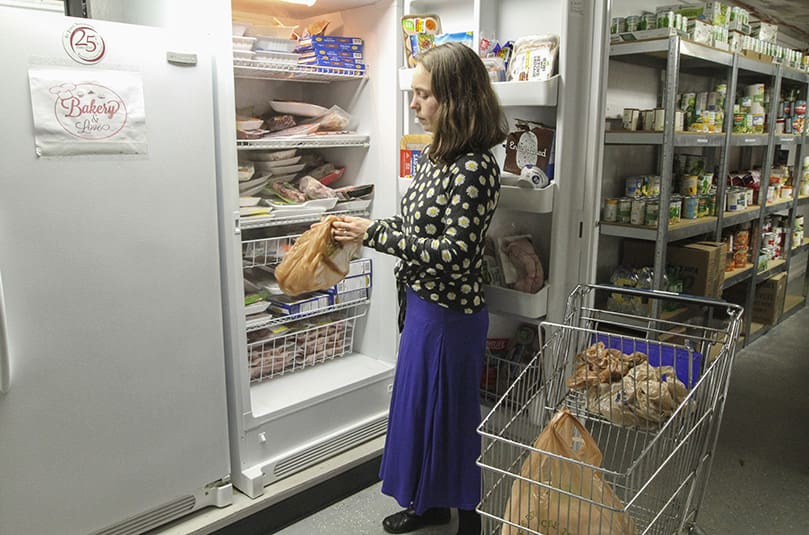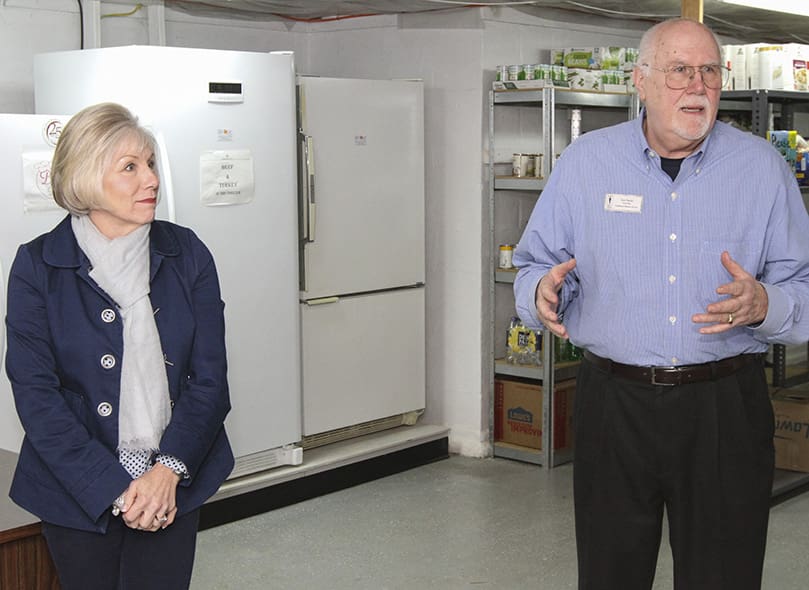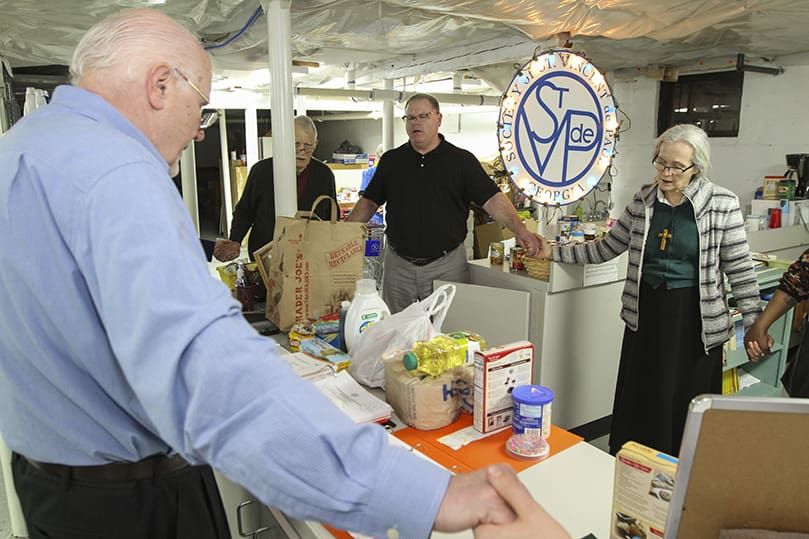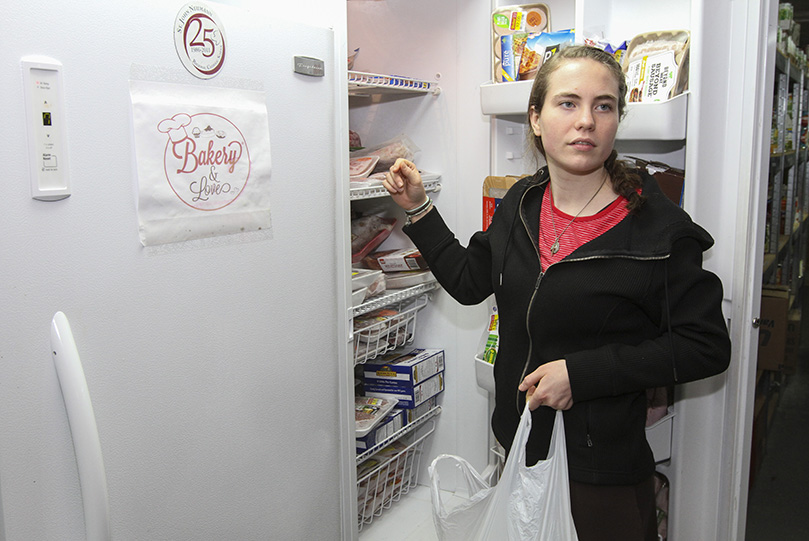Josephine Moorman, 18, bags up some meat from the freezer filled with beef and turkey for a client. Since it opened in 2013, Moorman has volunteered at St. John Neumann Church’s St. Vincent de Paul Society food pantry with her family. The food pantry is the recipient of frozen meat, produce and bakery goods that come from St. Vincent de Paul Georgia, as part of its Food Recovery and Distribution Program. Photo By Michael Alexander
Lilburn
Leadership of retiring SVdP Georgia director praised
By Andrew Nelson | Published February 20, 2020
LILBURN–Josephine Moorman reaches in the freezer, filling plastic bags with cuts of steak, ground beef, turkey and a small amount of pork.
It was just as the client Moorman assisted at the St. John Neumann Church food pantry requested. Moorman, a home-schooled senior, volunteers at this St. Vincent de Paul pantry, open twice a week.
For every person in a home, the pantry offers seven pounds of meat.
Working here you see the need in your own community, not having to travel outside our country to see people on the margins, Moorman said.
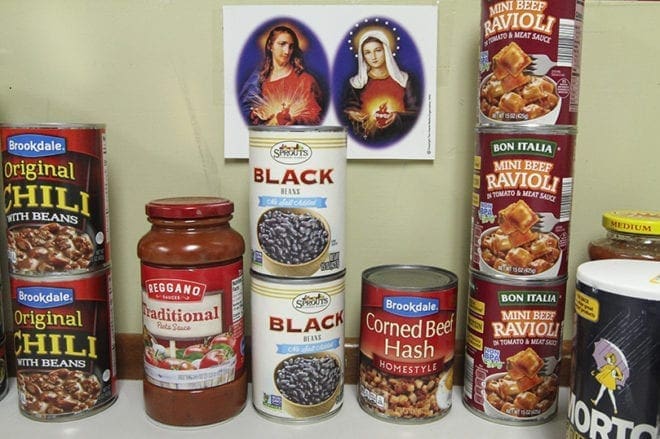
Holy cards, a crucifix and a religious statue are displayed around the St. Vincent de Paul Society food pantry at St. John Neumann Church, Lilburn. Photo By Michael Alexander
Before the pantry opened in 2013, the parish St. Vincent de Paul conference assisted people with a $20 grocery voucher. The conference provided close to $4,000 worth of vouchers.
In 2019, the food distributed is valued close to $80,000, said Leo Payne, a longtime leader and one of its founders.
“We knew there was a need for food, but we didn’t know all the moving parts,” said Payne, who teaches in Gwinnett County.
The availability of frozen meat alongside canned goods, bread and baked goods surprises people in need of assistance, said volunteers.
CEO introduces new serves in food pantries for clients
Innovation in the food pantry program and other services is one of the hallmarks of John Berry, who has led St. Vincent de Paul Georgia for 14 years. Berry, who is the CEO, recently announced plans to step down in September after completing several major projects.
During Berry’s leadership, the society and one of the country’s largest grocery stores partnered to reduce food waste. Since 2010, St. Vincent de Paul Georgia has worked with Kroger and the Atlanta Community Food Bank through Kroger’s “Zero Hunger | Zero Waste Food Rescue Program.”
St. Vincent de Paul Georgia collects meat, produce and non-perishable food items from nearly 40 Kroger stores to serve in food banks and pantries. In 2018, the program recovered some 720,000 pounds of food.
Carolyn Smith, who oversees the pantry in Dallas, said people often react with amazement to learn how St. Vincent de Paul can help. People cannot eat canned food only, instead they need a variety of food for a healthy diet, she said.
Wrapping up SVdP projects before departure
Berry plans to wrap up two large projects before retiring. Berry said he wants to conclude the organization’s $7 million capital campaign, the first in its history and transition the organization into its updated headquarters and family service center in Chamblee.
Coming from a career in the corporate world, Berry said there can be a lack of awareness about the pressures of working in nonprofits or human services.
“The stress level in this job is worse than it ever was in the corporate world. If you screw up here, someone is not going to have food, they are not going to have a roof over their head,” said Berry. “If you screw up here, you are going to screw up people’s lives.”
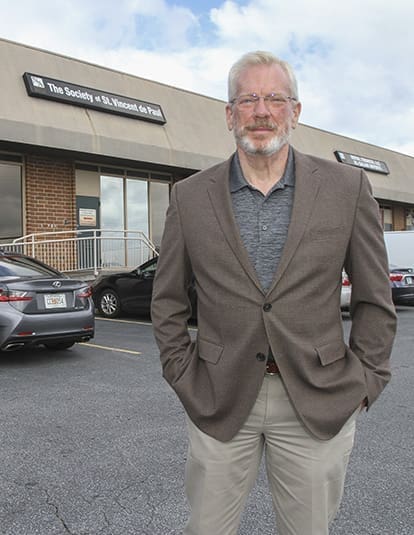
John Berry, the executive director of St. Vincent de Paul Georgia since 2006, will officially retire September 25. Photo By Michael Alexander
But during those inevitable bad days, he said he’d leave his office satisfied knowing someone’s life was made easier with the work of his colleagues and volunteers.
A national search for a successor is to begin in the spring.
“John is very much a collaborator. He is a very humble individual and focused. He is very good at meeting and telling our story. He has been a tremendous, tremendous leader. He will be sorely missed,” said Mark Bataillon, the chairman of SVdP Georgia’s board of directors.
The organization now has a higher profile in Atlanta philanthropic circles with the efforts of Berry, Bataillon said. That has opened up the organization to more partnerships with like-minded nonprofits and in reaching new donors.
Complexity of poverty requires comprehensive services
The Society of St. Vincent de Paul serves women, men and families living on the margins, moving them toward self-sufficiency. In 2018, the organization helped 130,000 people. About 15% of Georgia residents live in poverty.
Its 12 thrift stores raise money for clients. In addition, there are 38 food pantries offering fresh meat and produce. The program’s family centers help people enter the workforce, improve resumes and budget money.
The Georgia organization is linked with the international Catholic charity founded in France in 1833. The Atlanta chapter began serving the poor in 1903.
During his tenure as head of the conference, Berry said he’s learned how attacking poverty is a multifaceted challenge. The organization has expanded beyond writing checks to cover a utility bill or offer food, said Berry, 64. Now, the approach is to look at the root of poverty and work to alleviate it from all sides, with financial literacy, job placement and education, housing needs, healthy food and family support.
In December, St. Vincent de Paul Georgia began the renovation of its newly purchased headquarters and service center in Chamblee. The transformation includes doubling its local food market and creating a safety-net pharmacy to help low-income clients.
A burden confronting metro Atlanta now is rising housing costs, he said. People with jobs in the service and administrative industries a dozen years ago would have been secure in finding a home around Atlanta, he said. But his organization now works with people who find themselves squeezed out.
The Atlanta Regional Commission reported one in three households in the region are “cost burdened”—spending more than 30% of their income on housing.
Berry took on the position in 2006, with experience in the computer technology industry. He will continue to serve on the national board of St. Vincent de Paul and lend expertise to other nonprofits. Berry and his wife are members of Transfiguration Church, Marietta. They have three grown children.
